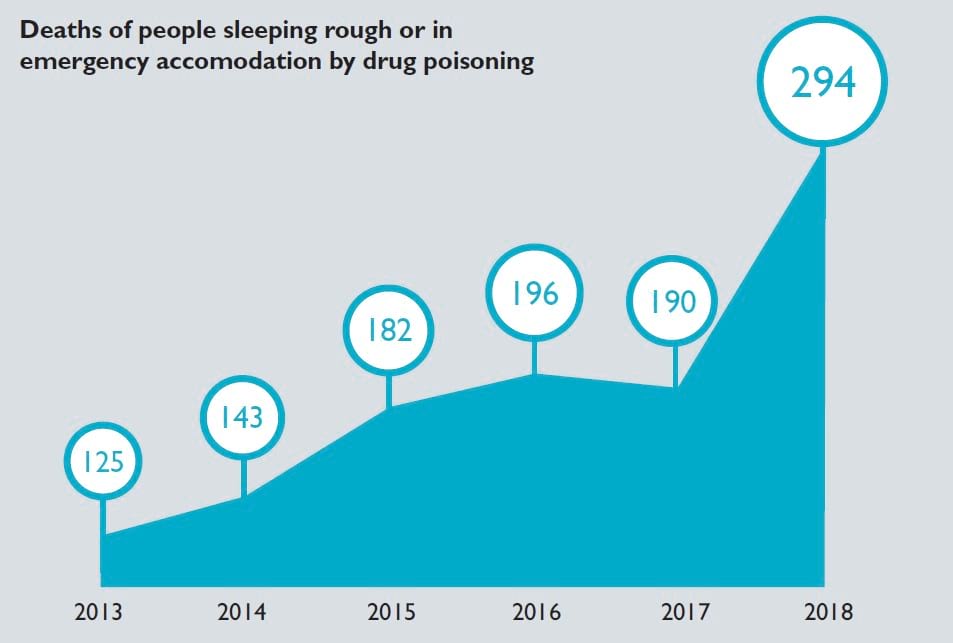Knocked back
New research from St Mungo’s reveals at least 12,000 people experiencing homelessness missed out on vital drug and alcohol services last year.
St Mungo’s has declared a health crisis on the streets saying cuts to services have resulted in record numbers of people who are homeless living with, and dying of, preventable drug and alcohol problems.
The report – Knocked Back: failing to support people sleeping rough with drug and alcohol problems is costing lives – is one of the most comprehensive investigations into the links between rough sleeping and substance use for 20 years. It includes new data analysis, in-depth interviews and peer research from across the country looking at the issues behind people’s drug and alcohol problems and the challenges they face accessing life-saving support.
The charity is calling on government to deliver on its commitment to join up health and housing in a new cross-government strategy to end rough sleeping. This includes action to end deaths on the streets, investing in drug and alcohol services and quickly establishing a ‘rough sleeping and substance use personalised fund’ to meet immediate needs.
Last year the ONS found that of the 726 deaths in 2018 of people who were sleeping rough or in emergency accommodation, more than half were alcohol or drug related. Deaths by drug poisoning had risen by 55% in just one year. St Mungo’s research looks into the issues behind this rise:
- At least 12,000 people sleeping rough, or at risk of doing so, are estimated to have gone without vital drug and alcohol treatment in England last year.
- Funding for drug and alcohol services has been cut by more than a quarter since 2015 -16.
- 6 in 10 people sleeping rough in London have a drug or alcohol problem, up from 5 in 10 people in 2014-15.
- In London there has been a 65% increase in women sleeping rough with drug and alcohol problems between 2014-15 and 2018-19, compared to a 16% rise in men.
- Rough sleeping and drug and alcohol problems are closely associated with traumatic experiences and isolation which often precede someone’s first night sleeping rough.
- Half of drug and alcohol services in the areas with the highest levels of rough sleeping say it will get harder to support people sleeping rough over the next two years.
“The cycle of constantly scoring and drug use, and missing appointments... this is something that needs to be addressed. At the moment, there are so many users waiting for such a limited service, that if you don’t attend one appointment, you get knocked back to the beginning.
Greg, currently sleeping rough Tweet
The report makes the following recommendations to the government
- Ensure that funding for drug and alcohol treatment is protected and increased, while also establishing a ‘rough sleeping and substance use personalised fund’ to meet immediate needs regardless of local connection or immigration status.
- Ensure services work better with the most vulnerable groups, by encouraging new trauma-informed approaches, shared ‘distance travelled’ outcome measures, and the provision of a greater number of specialist multi-disciplinary services providing integrated support.
- A clear commitment to end deaths on the streets over the next five years, backed up by an independent national programme to review trends, make recommendations and hold agencies to account.
- These efforts must be part of an updated cross-government strategy to meet the commitment to end rough sleeping by 2024. The strategy should recognise rough sleeping as a public health crisis, and set out a plan for providing the right integrated pathways of housing, treatment and support.
You can help by signing up to campaign for St Mungo’s at www.mungos.org/campaign




